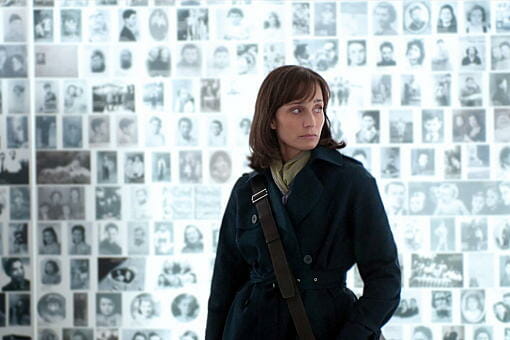By Meredith Alloway · September 6, 2011

Two women’s stories intertwine in this film about discovery and history; unfortunately, one of them is significantly less interesting than the other.
An American journalist, Julia (Kristen Scott Thomas), begins writing an article on the Vélodrome d’Hiver roundup in 1942, where Jews were imprisoned and made to wait for transport to the work camps. As her research continues, she begins to uncover the story of Sarah Starzynski (Melusine Mayance), a ten-year-old girl who was held captive there with her family. Just as Julia begins her article, we meet Sarah and learn that she has a secret: she has locked her brother in the closet at home, in hopes that he would be safe there. Her goal: to make it home and set him free. Immediately, we’re entranced by Sarah’s story and nearly forget about our narrator, Julia’s. But how could we not? The film attempts to successfully mirror a woman of today’s fears and struggles with that of a holocaust victim; how can they ever compare? Struggling to live well is very different from struggling to live at all.
The first half of the film gifts us with focus on Sarah’s story. The flashbacks to 1942 Paris are done with a graceful combination of heartbreaking realism and a continually surprising protagonist. Sarah and her family are taken to a holding camp in France after spending days, maybe weeks in the hot, dry and torturous Velodrome d’Hiver. The family is almost immediately separated, and when Sarah is torn from her mother by French officers, the one thing she manages to cling to is her key. Sarah’s determination to escape and make her way back to her brother is utterly astonishing and when people return her tender blue-eyed gaze with kindness, your heart melts.
Then, there’s Julia, providing us with a second protagonist’s struggle. She becomes more and more consumed with the story of Sarah and finding that her own family plays a large part in the Starzynski history. She is also pregnant with a child she “deeply wants to keep” and a husband who tells her, “I just as deeply don’t want it.” The more Julia learns of Sarah’s perseverance, the more she fights to proclaim what she’s uncovered and to stand up to her husband. The problem is that her attractive, Parisian husband is no where near as fearful as the demons Sarah faces, as both a child and those that haunt her as an adult.
Based on the novel by Tatiana de Rosnay, Gilles Paquet-Brenner’s (who also directs) screenplay wants to ask us not only the question, “What would you have done?” But also, “What can you do now?” Some of the most touching moments come when characters during the war give us an answer to this question. They are constantly doing something. Our characters in the present, with the exception of Julia who lifts a finger here and there, don’t do much at all, except remain about a beat behind the audience as far as knowledge on Sarah’s mystery. It’s always much more interesting when a character discovers at the moment we discover, instead of moments (in this case many minutes) after.
In the novel, where we have much more time to spend with Julia and pages devoted to her character development, I see it’s possible for this story to work, to have rhythm. We would care about her keeping her child, about leaving her husband, about learning her family in law has been living a lie….but we don’t.. We care about Sarah; and lucky for the film, we care about her a lot.
So for the first half of Sarah’s Key, sit back, get ready for a ride. But after, don’t worry about taking that much needed bathroom break or standing in line for a second round of sour patch, you won’t miss much.